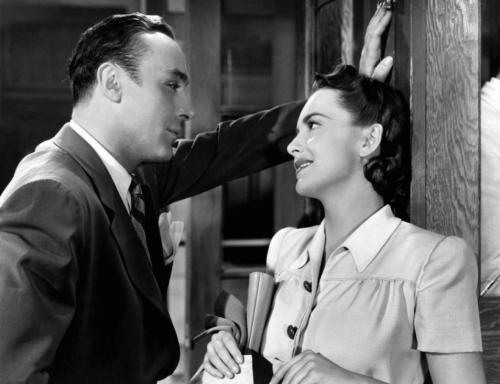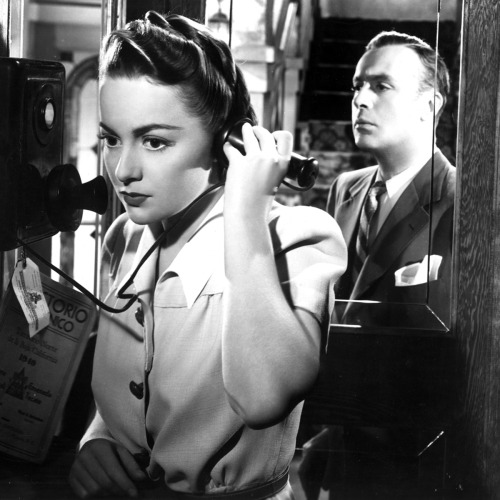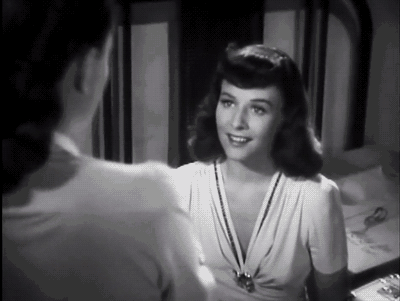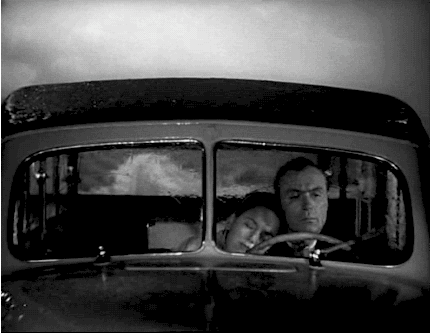Todo mundo
merece um lugar ao sol? Não sei ao certo, mas todo mundo quer um lugar ao sol.
E geralmente a busca por este lugar cheio de alegria e satisfação envolve a
migração. E o que acontece quando os imigrantes são parados no meio do caminho?
Quando eles são proibidos de entrar no lugar que escolheram como sua nova casa?
Você pode ligar a TV e encontrar respostas para estas questões agora mesmo, ou
você pode ver “A Porta de Ouro”, um filme feito há mais de 75 anos.
Does
everybody deserve a place in the sun? I’m not sure, but everybody wants a place
in the sun. And often the pursuit of this place of happiness and fulfillment demands
migration. And what happens when migrants are stopped midway their destiny?
When they are forbidden to enter the place they chose as their new home? You
could turn the TV and find answers for these questions right now, or you could
watch “Hold Back the Dawn”, a film made over 75 years ago.
Georges
Iscovescu (Charles Boyer) é um romeno que teve um probleminha na Europa e
decidiu migrar para os EUA. Ele chega a uma escaldante cidade mexicana na
fronteira, e descobre que, dos 150 mil imigrantes que o país deixava então
entrar todos os anos, havia uma cota pequena para os romenos – e ele teria de
esperar entre 5 e 8 anos para finalmente conseguir entrar no país legalmente.
Por isso, ele e outros imigrantes de diversas nacionalidades ficam em um hotel
até terem os documentos. O lugar tem um nome sugestivo: Hotel Esperanza.
Georges
Iscovescu (Charles Boyer) is a Rumanian who had a little problem in Europe and
decided to migrate to the United States. He reaches a hot Mexican city in the
border, and finds out that, among the 150 thousand immigrants the US let in
every year, there is only a very small quota for Rumanians – and he must wait
from 5 to 8 years to finally be able to get in the US legally. So, he and other
immigrants from several nationalities stay in a hotel until their visa is
ready. The place has a suggestive name: Hotel Esperanza (Hope Hotel).
Mas a
esperança não é a última que morre ali. Quando Georges chega ao hotel, um
imigrante alemão havia se cansado de esperar e comete suicídio. No hotel,
Georges encontra uma velha conhecida, Anita (Paulette Goddard), que lhe dá uma
dica: é mais fácil e rápido ser admitido nos EUA se você se casar com uma
norte-americana.
But hope is
not the last one left standing there. When Georges arrives at Hotel Esperanza,
a German immigrant has got tired of waiting and committed suicide. At the hotel
Georges finds an old acquaintance, Anita (Paulette Goddard), who gives him a
tip: it’s much easier and quicker to be admitted to the US if you marry an
American.
Então,
Georges começa a paquerar todas as norte-americanas que ele encontra. A primeira
delas acaba sendo uma mulher casada, mas a segunda norte-americana que ele
encontra é Emmy (Olivia de Havilland), uma professora que levou seus aluninhos
bagunceiros para uma excursão no México durante o feriado de 4 de julho – uma
atividade pedagógica que desafia a lógica, eu sei. Georges é charmoso e diz
coisas lindas para ela, e o plano funciona: no dia seguinte, eles estão
casados. O plano de Georges consistia, desde o começo, em se casar com Emmy,
ser aceito nos EUA – escapando assim da vigilância do inspetor Hammock (Walter
Abel) – e depois pedir a anulação do casamento e viver livremente nos EUA com
Anita.
So, Georges
starts hitting on all American women he sees. The first one happens to be
already married, but the second American woman he finds is Emmy (Olivia de
Havilland), a schoolteacher vacationing with her young and loud students in
Mexico for the 4th of July holiday – something that defies the
logic, I know. Georges is charming and says beautiful things to her, and the
plan works: on the following day, they’re married. Georges’s
plan has been, all along, to marry Emmy, be accepted in the US – thus escaping
the vigilance of Inspector Hammock (Walter Abel) – then ask for an annulment and
live freely there with Anita.
Há duas
boas surpresas em “A Porta de Ouro”. Uma é a maneira como o filme começa:
Georges está fugindo e entra em um estúdio de cinema, onde ele conta toda sua
história de imigrante e falso amante para um diretor chamado Dwight Saxon (o
próprio diretor do filme, Mitchell Leisen). O senhor Saxon estava filmando uma
cena com Veronica Lake, e quando ele liberou a equipe, pôde finalmente ouvir a
história de Georges. A outra boa surpresa é a lua de mel de Georges e Emmy em
uma vila mexicana, onde eles participam de uma cerimônia religiosa. Não há nenhum
estereótipo nesta parte do filme!
There are two
nice surprises in “Hold Back the Dawn”. One is the way it starts: Georges is on
the run and enters a film studio, where he tells his whole story as an
immigrant and fake lover to a director called Dwight Saxon (director Mitchell
Leisen himself). Mr. Saxon was filming a scene with Veronica Lake, and when he
dismissed the team he was able to listen to Georges’s story. The other nice
surprise is Georges’s and Emmy’s honeymoon in a Mexican villa, where they take
part in a religious ceremony. There are no ugly stereotypes there!
Foi uma
surpresa incrível e uma coincidência assustadora eu ter escolhido este filme
para ver exatamente quando acontece um episódio que não pode ser considerado
uma crise de imigração, mas um crime humanitário. Eu tento fugir da política,
mas ela me persegue! Por falar em perseguir algo – um sonho - , em uma cena
emblemática, um professor estrangeiro, no almoço de 4 de julho, recita para um
oficial da imigração o poema na base na Estátua da Liberdade – um texto que prega
valores que muitos americanos não apenas esqueceram, mas nos quais nunca sequer
acreditaram.
It was an
incredible surprise and a chilling coincidence that I chose to watch this movie
exactly in the middle of an episode that can't be considered an immigration
crisis, but a humanitarian crime. I try to stay away from politics, but they go
after me! And talking about going after something, in an emblematic scene, a
foreign professor, on the 4th of July lunch, recites to an immigration officer
the poem on the basis of the Statue of Liberty – a text that shows values that
many Americans not only have forgotten, but have never believed in the first
place.
Um momento
ruim aqui: Emmy fala dos EUA como a tão divulgada “terra de oportunidades” e
compara o país com um lago que deve receber sempre novas correntezas para não
ficar parado. Georges comenta: “o seu povo está construindo diques bem altos
para parar estas correntezas”. A resposta dela? “Só
para deixar o LIXO de fora”. Meu Deus. Isso poderia ter sido dito por um
ultraconservador ontem mesmo.
A bad moment
here: Emmy talks about the US as the so-called “land of opportunities” and
compares the country to a lake that must keep receiving new streams to never go
stank. Georges comments: “your people are building pretty high damps to stop
these streams”. Her answer? “Just to keep out the SCUM”. Oh my God. This could have
been said by an ultraconservative yesterday.
Não nos
esqueçamos de que os roteiristas eram Charles Brackett e Billy Wilder – e Wilder
era um imigrante, assim como as estrelas Charles Boyer (francês) e Olivia de
Havilland (nascida no Japão). A maioria dos coadjuvantes também eram
imigrantes, e formaram um grupo muito interessante que merecia muito mais
destaque no filme.
Let's not
forget that the screenwriters were Charles Brackett and Billy Wilder – and
Wilder was an immigrant. So were the stars Charles Boyer (French) and Olivia de
Havilland (born in Japan). Most of the supporting cast was also made of
immigrants, and they were a very interesting group that deserved a lot more screen time.
Vamos dar
uma olhada nestes personagens incríveis que esperam por seus vistos no Hotel
Esperanza. Há o casal Kurz, Berta (Rosemary DeCamp) e Josef (Eric Feldary,
vindo da antiga Áustria-Hungria). Eles esperam um bebê, e o sonho deles é que o
bebê possa nascer sendo um cidadão norte-americano. Bonbois (interpretado por
Curt Bois, um ator alemão que fez seu primeiro filme em 1908 e o último em
1988) é um nervoso cabeleireiro francês que serve de alívio cômico. Há também o
porfessor Van Den Luecken (o ator belga Victor Francen) e suas duas filhas,
Christine (Micheline Cheirel) e Anni (Madeleine Lebeau). Ambas eram atrizes
francesas – e Madeleine é parte importante da icônica cena da Marselhesa em “Casablanca”
(1942).
Let’s take a look
at these amazing characters waiting for their visas at the Hotel Esperanza. There
is the Kurz couple, Berta (Rosemary DeCamp) and Josef (Eric Feldary, from
former Austria-Hungary). They are expecting a baby, and dream that him or her
can be born an American citizen. Bonbois (played by Curt Bois, a German actor
who made his first film in 1908 and his last in 1988) is a nervous French coiffeur
who serves as the comic relief. There is also professor Van Den Luecken
(Belgian actor Victor Francen) and his two daughters, Christine (Micheline
Cheirel) and Anni (Madeleine Lebeau). Both actresses were French – and Madeleine
is an important part of the iconic Marsellaise scene from “Casablanca” (1942).
Boyer é
suave e charmoso como sempre. Olivia é adorável como sempre, tendo de ser
ingênua a maior parte do tempo. Paulette Goddard está bem como uma femme
fatale da fronteira. Mas os reais destaques são os imigrantes desesperados
do hotel. Eles são a prova cabal e tangível de que a diversidade é o tempero da
vida – e a melhor coisa deste filme.
Boyer is
suave and charming as always. Olivia is lovely as always, having to be naïve
most of the time. Paulette Goddard is good as a femme fatale of the border. But
the true MVPs are the desperate migrants in the hotel. They are the real,
touchable proof that diversity is the spice of life – and the best thing in
this film.
This is my
contribution to the third annual Olivia de Havilland blogathon, hosted by Laura
and Crystal at Phyllis Loves Classic Movies and In the Good Old Days ofClassic Hollywood.











3 comments:
Lovely, timely post on a movie that shows that not only are our political problems never changing, but thinking people have always been aware.
Amazing how this film is relevant today.. Over a decade ago my brother drew a sketch of the Statue of Liberty pointing for a Mexican to go back to Mexico. Sad that it’s still relevant.
Thanks for bringing this important film of Olivia’s to her birthday celebration!!
Thanks for writing
Post a Comment